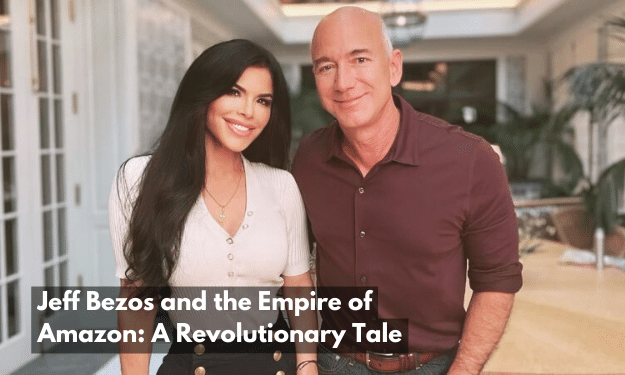Jeff Bezos and the Empire of Amazon: A Revolutionary Tale

Since Jeff Bezos launched Amazon as an electronic bookstore in a garage, the site has altered every aspect of shopping, reading, and the media. In the digital era, Bezos has stood out due to his leadership in innovation and customer service.
The humble beginnings of a future tycoon
Jeff Bezos's childhood is characterized by his insatiable curiosity about mechanics rather than the digital business he would develop later. In early January 1964, a young man who would later become a powerful industrial leader and shake up the corporate world, including car manufacturing, inhaled his first breath in Albuquerque, New Mexico. A visionary and obstinate person pushed him to grow from a child interested in how things work to becoming Amazon's founder.
His early devotion to science and technology did not come as a surprise, as it later paved the way for his Amazon innovations. As a child in Miami, Florida, Bezos would convert his parents' garage into a laboratory and start exploring and dreaming. He studied computer science and electrical engineering at Princeton University, facilitating his imagination of the economy. This journey from bookseller to online entrepreneur granted Bezos the tools and practices he needed to make his mark in the retail industry.
Beginnings of Amazon
Amazon should also be online, even though the shops don't have billions of volumes. Although the odds of losing out on everything were 70 %, they persuaded their parents to invest money in running the company. The personal bank loans and parental donations garnered him an additional $300,000. After 50 sessions with local private investors, he got the $1 million. Jeff Bezos offered Cadabra. And his LinkedIn profile for his online business.
The beginning date of the firm is 1994 July 5. Bezos rebranded Amazon.com in 1995. It was done to facilitate the spelling and memorizing of this address. Search engines would entitle the site to go to the top because it begins with A. In the early 1990s, the base of the website was alphabetized. By 1997, sales hit 147 million, when it went public on the stock market at $18 per share. The company was made public on May 15, 1997. It managed to raise $54 million with that. The stock price grew to 233% by the end of the year. Amazon seizes Zappos (2009), Twitch (2014), and Whole Foods (2017). Amazon integrates Prime Video, S3, and Web and provides listening options. Every year, the company went further towards its peak.
Jeff Bezos Net Worth 2024
DateNet Worth
✔ June 1997: $150 million
✔ June 1998: $1 billion
✔ June 1999: $10 billion
✔ March 2000: $6 billion
✔ December 2000: $2 billion
✔ September 2001: $1.5 billion
✔ September 2003: $2.5 billion
✔ September 2004: $5.1 billion
✔ September 2005: $4.1 billion
✔ September 2006: $4.3 billion
✔ September 2007: $8.7 billion
✔ September 2008: $8.2 billion
✔ September 2009: $6.8 billion
✔ September 2010: $12.6 billion
✔ September 2011: $18 billion
✔ December 2012: $23.2 billion
✔ October 2013: $29 billion
✔ December 2014: $30.5 billion
✔ July 2015: $50 billion
✔ October 2016: $45 billion
✔ December 2017: $73 billion
✔ July 2018: $150 billion
✔ September 2018: $170 billion
✔ April 2019: $114 billion
✔ July 2020: $190 billion
✔ July 2021: $213 billion
✔ November 2022: $117 billion
✔ November 2023: $170 billion
✔ May 2024: $208 billion
Early life and education
Technology and Jeff Bezos's creativity are some of the driving forces behind Amazon. From the start, Bezos was a science and engineering enthusiast. He made efforts to express his parallels to life. Bezos knew society's computers. He attended Princeton University, a renowned higher education institution. At this school, he learned computer science and electronic engineering, which helped influence his success in the digital domain.
Being at Princeton shaped and moulded him, making him wiser and more sensible. He is a logical thinker and always foresees changes. He realized that if Amazon's disruption materialized, he could potentially dominate the retail industry. He succeeded in wholly blending his passion for technology and finance; hence, he became familiar with the complex connotations of the Internet business. Jeff Bezos' digital knowledge and excitement started Amazon's new phase of business and innovation.
How did Jeff Bezos start his business?
In the 1990s, Jeff Bezos got the idea for an internet marketplace. Bezos envisioned the organization as a new-generation corporation, bolstered by internet connectivity, following exponential growth. Bezos had a specific objective: to start an online bookstore with millions of books that were more than a regular shop could afford. Amazon, whose core idea was it.
Meticulous planning was the key as Bezos jumped the sixty-six-foot hurdle in 1994. He abandoned the seductive lure of Wall Street for Seattle's innovative technological population and a large book distributor. He started with a garage and built Amazon from scratch. He wrote the code for Amazon with assistance from a few reliable individuals. Amazon's customer-centric approach originates in packing books and then trudging to the post office. The garage-based book operation was just the first step. Because of Bezos' ingeniousness and customer-centricity, Amazon became a multi-product company.
Amazon: From an Online Bookstore to a Retail Giant
Although it began as a bookstore, Amazon was not where its retail revolution ended. Their online bookstore was fast enough to add other products, such as electronics, food, clothing, and more. Constant improvement and customer service have always led to this company's ongoing upgrades. With its advanced logistics network and distribution, Amazon follows a similar story. Amazon Web Services (AWS) has contributed most to the company's revenue since the birth of cloud computing. Customer gadgets like the Kindle e-reader became the first steps to Amazon's leadership in the e-book revolution. With Prime Video and Amazon Music, Amazon crossed over from the real to the digital world. Thanks to its frictionless buying experience, Amazon went from the local market to the worldwide one and became the global retail giant.
Jeff Bezos owns houses and properties in real estate.
Although a few billionaires like to make their wealth heard, Bezos is more uniform in his personal life. His $98 million Madison Square penthouse, apartment, and floor are among his few upper-end possessions. He also owns a $23 million Washington, D.C., residence, a $165 million Beverly Hills mansion, and a $30 million Texas ranch. He has dozens of California estates.
Leadership and Philosophy: The Bezos Blueprint
Bezos is the perfect leader for innovation and customer satisfaction, as he balances both of them. Bezos's strategic long-term thinking is the key component that enabled Amazon to be a cutting-edge technological and retail leader. Although Amazon is huge, Bezos's "day 1" mentality supports innovation and flexibility, which is not typical of large corporations.
Bezos appreciates failure as part of success and thus supports risk-taking. He encourages Amazonians to broaden their horizons, propelling the company beyond its existing markets and technologies. Yet another element of Bezos's leadership is the "two-pizza rule," under which these teams remain small and flexible to empower efficiency and innovation.
Bezos's Legacy and the Future of Amazon
As Amazon's Jeff Bezos evolves into the role of executive chairman, his legacy becomes substantial. His vision and ingenuity have transformed retail and positioned Amazon for the future. Andy Jassy, the architect of Amazon Web Services, is expected to become Amazon's face in future technologies, customer realm enrichment, and maintaining Bezos' customer obsession and innovation.
Multiple industries and daily lives may benefit from the company's technological and strategic breakthroughs. Under Bezos' leadership, Amazon has adapted, yet his culture remains intact. Amazon will harness the future power of technology, which ultimately drives change worldwide, with a legacy based on the blazing spirit of invention. While cloud computing, AI, healthcare, and leisure may promise expansion, it is too early to tell which will lead the way.



